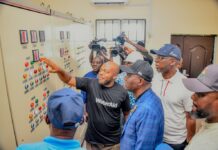If you don’t know Ndubuisi (“Dele”) Udo, it is not your fault. The Nigerian police did not allow him to be great. As a teenage athlete in the 1970s, Udo was a collegiate champion at the University of Missouri in the United States. He was a three-time member of the National Collegiate Athletic Association (NCAA) All-American team. He was a holder of numerous Missouri, Big Eight and NCAA records. Then he came to Nigeria in July 1981 in preparation for the 3rd IAAF World Cup scheduled for September 1981 in Rome, Italy. The quarter-miler would never return to the US again, neither would he fulfil his dreams and aspirations of conquering the world in athletics.
One evening, he left camp with some of his colleagues to buy suya at Ojuelegba, Lagos state. They were stopped at a police checkpoint. You know how it goes with the Nigerian police. One thing or the other, they got into an argument. Then a policeman pulled out his gun and shot Udo. He was dead in nanoseconds. As young as I was then, I could not resist the tears when I watched his funeral on TV. He was just 24. He had been part of the Nigerian team to the 1980 Olympics in Moscow. Although he did not win any medals (Nigeria came back empty-handed), his future looked bright. He was just warming up. He made it to the semi-finals of 400 meters and was part of the 4x400m team.
The prodigious product of National High School, Aba, had been married to an American lady for just three weeks when the Nigerian police murdered him. Udo’s wife was pregnant with their daughter, who would never see her father. They killed him. Police killed him. They murdered his hopes and dreams with a solitary, sickening bullet — over nothing. What happened next? You know the drill: the killer policeman was detained; the inspector-general of police, Mr Sunday Adewusi, who was new on the job then, promised a thorough investigation; President Shehu Shagari vowed that justice would be done; and a street was named after Udo in Ikenegbu Layout, Owerri, Imo state. The end.
Adewusi, now late, would go on to unleash the mobile police unit (MOPOL) on Nigerians in the 1983 general election. The notoriety of the anti-riot unit earned them the nickname: “Kill and Go.” And here, 39 years after the gruesome murder of Dele Udo, we are still reeling under police brutality. Innocent souls are still being battered, this time by the Special Anti-Robbery Squad (SARS) which has displaced MOPOL on the cruelty league table. Murderous police officers are still being arrested and detained. The inspector-general is still promising to investigate the “remote and immediate” causes. The president is still promising justice and action. Does anything really change in Nigeria?
The latest public outrage over the impunity of SARS — triggered by the reported shooting of a young Nigerian in Ughelli, Delta state — offers President Muhammadu Buhari an opportunity of a lifetime to write his name in gold by carrying out a comprehensive reform of the police. It is in our best interest. This is not the time to be taking photographs with the IGP and issuing press statements to the effect that he has been directed to do this and that. The police hierarchy are part and parcel of the problem.
They have always resisted attempts to make a fundamental change. They mouth one thing and do another. You and I know the reason. Why change a system that feathers your nest?
Before SARS, police had always engaged in vicious extrajudicial killings. There is nothing we are saying about SARS today that we have not said about other police units in the past, except that today we are in the internet age and officers have seized the opportunity to open new shops dedicated to yahoo boys and girls. Task forces set up by various state governments to enforce traffic rules and environmental laws are notorious for human rights abuses. Police officers will first slap a bus driver before arresting him for stopping at an illegal bus stop. Police officers rent guns to armed robbers or even partake in robbery operations themselves. SARS is just a tip of the iceberg.
Why are police officers generally so brutal? Why are they so arbitrary? Why do they drive against traffic? Why do they drink and gamble? Why do they rape? Why do they make themselves available to be hired to settle personal scores in purely civil matters? Why do they openly extort money from motorists? Why do they steal exhibits? Why do they lack respect for human dignity? These questions go beyond SARS. They hit at the heart of everything that is wrong with our police force. Disbanding SARS can only be a starting point. But if the factory that produces these cold-blooded police officers remains open and is not overhauled, we would only be scratching the surface.
Meanwhile, the truth is that police officers are also not completely useless. They are out there risking their lives to protect us. They are awake while we are sleeping and snoring. They are standing by the roadside while we are in our air-conditioned offices. They are always the first target when armed robbers want to strike. They are human beings like us. They are fathers and mothers. They are uncles and aunties. Ironically, these same police officers win medals when they are on duty outside the country, especially on UN and AU missions. How do we explain that? Is there something about the Nigerian water that destroys their humanity? Is it our culture of impunity?
In 2004, I did a mini-study on the police, with great help from my friend and foot soldier, Ibrahim Sule (who sadly passed away last year). I wanted to understand the problems and challenges. I focused the research on the recruitment process and the conditions of service. I then wrote a series of articles based on my findings. Here is a quick summary. The recruitment was terribly flawed. Because of our poor record keeping, ex-convicts, including armed robbers, and unfit persons were being recruited into the force. The conditions of training could only produce beasts. The hostels were inhabitable, the food was appalling and even their allowances were not being paid.
Firearms training was grossly inadequate. Many recruits finished training without being properly taught arms handling. Recruits had to bribe to get official uniforms. What’s more, at every level and stage in the recruitment process, there was fraud. Police belts and shoes were being hawked openly. For those already inside the force, the tales were sadder. They saw their colleagues die on duty and their widows battle and struggle for years to collect the entitlements. One senior officer once lamented to me: “Is this what will happen to my family if I die serving this country?” Police officers were being given patrol vans without fuel. They had to fuel the vehicles from their own pockets.
“You think we don’t know they extort motorists?” a very, very senior police officer told me. “We just look the other way because we don’t give them money for fuel.” Guess what happened to the fuel budget. Officers were being transferred without plans for accommodation and without getting their allowances. I was at the Pen Cinema police station, Agege, Lagos, one morning and saw policemen sleeping inside a van. One officer told me: “They were transferred from Enugu last month. There was no plan for accommodation, so they sleep inside patrol van, wake up very early in the morning to have their bath, and they have to go on patrol without funds being provided for fuel.”
I can’t remember what officers were being paid as hazard allowance then but it was a pitiable pittance, while politicians were feasting on billions of naira. Have you ever gone to report a case at a police station and you are asked to “mobilise” officers to for investigation? This is the back story: there are hardly any funds made available for investigation. An officer told me some years ago that he had to be transporting suspects to court from his own pocket. Many suspects rot in police cells for this reason. A police officer confided in me that he resorted to drinking dry gin and smoking marijuana anytime he was on night duty to gain “Dutch courage”. He often felt vulnerable.
Fellow Nigerians, you can now imagine what would happen when you unleash these bitter, desperate, frustrated, ill-trained, cheated, demoralised, disoriented and dehumanised human beings on the society — and then give them guns, to boot. You ask them to police people who look successful, respected and well-nourished, people who treat them with disdain and suspicion. For clarity, I am not making any excuses for their impunity. Poor training and operational conditions do not excuse the insanity. But my point is: in the end, we are getting the kind of police that we breed. The foundation is faulty. A police officer will always be a police officer, no matter the unit or station.
That is why the problem is deeper and wider than SARS: the mould that produces police officers needs to be reshaped. Since we cannot do away with them, we have to make them more effective and recondition them to see their job as that of protecting the people, not extorting, oppressing or killing them. There is no proper consequence management and accountability process in place. When you give people power over others, give them guns, and empower them to literally make the difference between life and death, you should realise that there will be abuse and impunity and make an arrangement to address it. It is clear that no such strong mechanism currently exists. If I were to advise President Buhari, though, the first thing is for him to seize the moment by disbanding SARS immediately. That would be the starting up. That would send a strong signal that this is not the usual presidential lip service. Also, he should order a thorough investigation of their atrocities, perhaps a truth commission that will lead to the prosecution of erring officers and commanders. Above all, he has to overhaul the police force. We need to look intensely into the recruitment process, the orientation, the welfare, the budgeting, the accountability and the entire operations. There is something that makes them behave the way they do. Let’s get to the root






